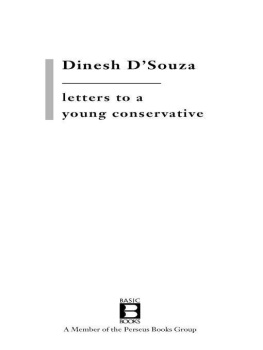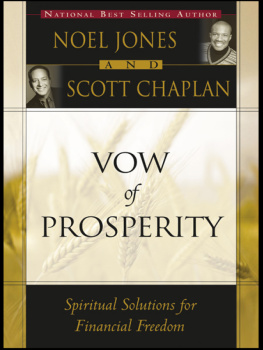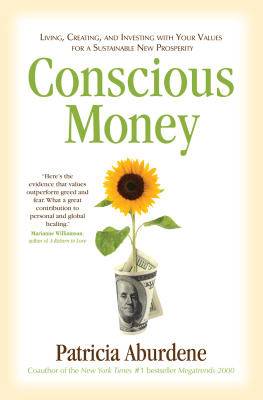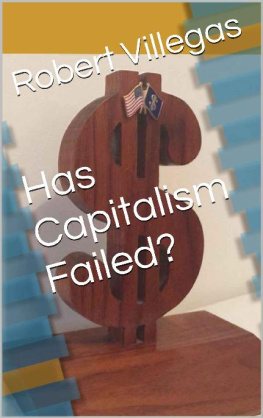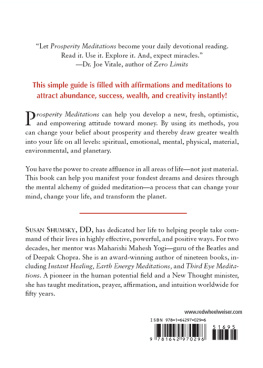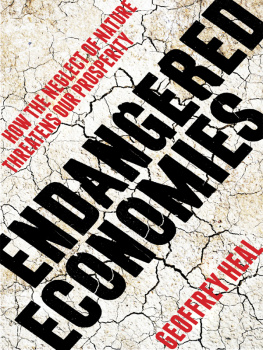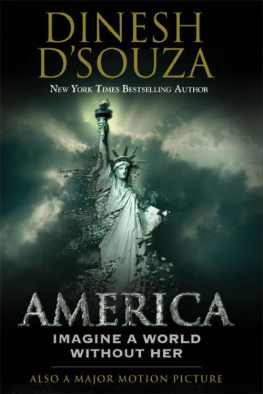Praise for The Virtue of Prosperity
Skillfully illuminate[s] the ethical quandaries of the new prosperity.
National Review
DSouza tells us whats right, and whats wrong, with our brave, new, prosperous world.... Richly illustrated with fascinating anecdotes.
Kirkus Reviews
A possible heir to Michael Lewiss role as an insightful chronicler of our times. Delivered in a unique voice and with an unusually light touch.
Publishers Weekly
DSouza presents a balanced picture of the current debate between those who applaud technologys achievements and resulting new wealth, and others who deplore the secularization and commodification of human experience that has resulted from our growing dependence on machines and computers.
Lane Jennings, The Futurist
We have freedom, wealth, and the power to shape a new universe. The last people to find themselves in these circumstances were Adam and Eve. In a great book, DSouza reminds us: do not log onto www.serpent-chat.com.
P. J. ORourke, author of Eat the Rich
Dinesh DSouza has done a masterful job of sorting out the explosive issues surrounding todays new wealth and technology. If you want to understand the social and moral implications of the new economy, read this lively and thorough analysis.
Jim Barksdale, founder of Netscape
As skillfully as Virgil guiding Dante, Dinesh DSouza takes you on a breathtaking tour of the new economy. He gives a brilliant and balanced account of the divisions and debates in this new world arising. You will not know during pages of suspense how he will rule, which will keep you flying through this book as fast as a jet.
Mark Helprin, novelist
This book shows where the new economy is headed and goes beneath the surface to illuminate the hard choices facing our businesses, our personal lives, and society. It is exactly what we expect from DSouzaan indispensable book that is also a great read.
Harvey Golub, chairman and CEO, American Express
Applying old values to the new economy, Dinesh DSouza has written a provocative, witty, pertinent, and important book.
Michael Medved, nationally syndicated talk-radio host
A fascinating and wonderful book. Even when you disagree with him, DSouza raises the level of the debate and makes you think. What more could you ask for?
John Stossel, ABC News
In this bracing book, DSouza neatly inserts himself between the technophiles, who welcome the limitless expansion of technological innovation, and the technophobes, who fear that old values will disappear in this Brave New World. Whatever your politics, read this witty, informative, learned, and lively book.
Stanley Fish, Dean of Arts & Sciences,
University of Illinois, Chicago
Also by Dinesh DSouza
ILLIBERAL EDUCATION
The Politics of Race and Sex on Campus
(1991)
THE END OF RACISM
Principles for a Multiracial Society
(1995)
RONALD REAGAN
How an Ordinary Man Became
an Extraordinary Leader
(1997)
In memory of my father,
Allan DSouza
19332000

TOUCHSTONE
Rockefeller Center
1230 Avenue of the Americas
New York, NY 10020
Copyright 2000 by Dinesh DSouza
All rights reserved,
including the right of reproduction
in whole or in part in any form.
First Touchstone Edition 2001
T OUCHSTONE and colophon are trademarks
of Simon & Schuster, Inc.
The excerpt from Wired on pages 16163 is used with permission.
Visit us on the World Wide Web:
http://www.SimonSays.com
ISBN-10: 0-7432-4206-8
ISBN-13: 978-0-7432-4206-6
ACKNOWLEDGMENTS
This book would not have been possible without the valuable help of Bruce and Valerie Schooley. Bruce is actually the person who suggested the idea for the book, and he has been involved with it every step of the way. My wife, Dixie, has been a vital source of ideas and suggestions, and has patiently supported me in my labors. My daughter, Danielle, proved to be both an inspiration and, as the reader will discover, an occasional source of research material. My research assistants, Aaron Solomon and Todd Ostroske, were also indispensable. I am very grateful to the American Enterprise Institute for the freedom to pursue projects like this one. Chris DeMuth, president of AEI, is not only the ideal boss but also a very helpful reader. I am pleased to acknowledge the John Olin Foundation, which has provided me with research support over the years. My agent, Rafe Sagalyn, was even more involved than usual in shaping the concept of this book. My editor, Liz Maguire, provided constant encouragement and helpful criticism. While I cannot list all the people I interviewed or whose advice I solicited, I especially wish to thank Larry Arnn and the Claremont Institute, Karlyn Bowman, Robert and LaDorna Eichenberg, David Gerson, Tom Henriksen, Rich Karlgaard, Marvin Kosters, Larry Lindsey, Adam Meyerson, Jim and Mary Nierman, Jim Piereson, John Raisian, Spencer Reiss, Ron Robinson and the Young Americas Foundation, and Scott Walter.
CONTENTS
GEEK CHIC: Anthropologist in a Strange Land
A WORLD WITHOUT LIMITS Whats New About the New Economy
THE GATHERING STORM Mass Affluence and Its Discontents
CREATED UNEQUAL Merit and the Ones Left Behind
THE LOTTERY OF SUCCESS Who Wins, Who Loses
EYE OF THE NEEDLE The Moral Critique of Prosperity
THE WORLD WE HAVE LOST Goodbye Nature, Family, and Community?
A FUTURE THAT WORKS Why Techno-Capitalism Prevailed
THE CONQUEST OF HUMAN NATURE Technology and the Remaking of Humanity
THE SEDUCTION The Quest for the Posthuman
THE GIFT The Things That Matter the Most
Long is the way and hard,
That out of hell leads up to light.
Milton, Paradise Lost
INTRODUCTION
Geek Chic
Anthropologist in a Strange Land
You can observe a lot by watching.
Yogi Berra
T o see the new world that is being born, you dont have to go to Silicon Valley. You can see it in Austin, Texas; Boise, Idaho; Boston, Massachusetts; Salt Lake City, Utah; Raleigh-Durham, North Carolina; Reston, Virginia; Champaign, Illinois; or any of the other high-tech cities that dot the map of the United States. You can also find it in Montreal, Canada; Cambridge, England; Dublin, Ireland; Tel Aviv, Israel; Melbourne, Australia; Kuala Lumpur, Malaysia; Taipei, Taiwan; or Bangalore, India. Actually, you dont have to go anywhere. Just turn on your computer and get onto the Internet, that global brain detached from human bodies and powered by hundreds of millions of silicon transistors.
I am in Silicon Valley, however, which is the nerve center of the computer and telecommunications revolution transforming the world economy. Home to an estimated 250,000 millionaires, Silicon Valley has been described as the only place in the world not trying to figure out how to be Silicon Valley. Here, on Sand Hill Road, sit lordly venture capitalists willing to bet millions of dollars on new ideas that promise to wipe out old industries. Here are semiconductor companies that convert sand and oxygen, two of the most abundant materials on earth, into silicon chips, making possible e-mail, e-commerce, e-everything. Apple Computer is based here, as are Cisco, Intel, Oracle, Sun, Yahoo!, eBay, and E*Trade. Most important, there is a critical mass of brainpower here that rivals that of any other place or time in history. The people of the Valleymany of them scientists or entrepreneursare determined to keep astonishing the world and to ensure that the technological revolution unleashed by the silicon chip never stops.


